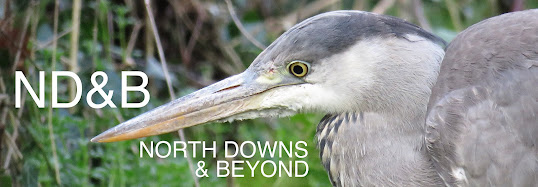Redwing roost
With good numbers of Hawfinches having been picked up by vismiggers over the past few weeks I was inspired to check out the western-most valleys on Headley Heath - where, two years ago almost to the day, I located a Hawfinch roost which stayed into December, drawing a fair few birders to enjoy the experience.
I arrived at 13.30hrs and positioned myself between the two valleys, at the spot that proved so rewarding back in 2017. Two hours later I was not just Hawfinch-less but almost birdless. It was really quiet, with just a handful of Chaffinch, Goldfinch, Redwing and Fieldfare to break the monotony. I decided to switch position, moving up to the top of the eastern valley and look back westwards. The light was beginning to fade but the calm conditions and slight chill in the air were quite invigorating, so I stayed put, just taking in the lovely scene before me. Then, at 15.55 hrs, and for the next 30 minutes, Redwings started to pour into the valleys, arriving from the west (Box Hill, Mickleham) and east (Headley Heath behind me). Most birds alighted in trees at the southern end of the valleys, with a fair few continuing eastwards (these birds following the line of the Headley - Mickleham Road.) As the light went it became harder to pick the birds up and I was more than aware that being on my own I was missing many birds. My final total of 1400 is a woeful under estimate. Whether or not these birds will move on, or a genuine winter roost is being formed, time will tell. Largest flock size was 150.
I could have packed up as the light started to go and been under the impression that the thrush numbers on site were very poor indeed. Just shows how we need to be in the field as much (and as long) as possible to fully appreciate what goes on.
I arrived at 13.30hrs and positioned myself between the two valleys, at the spot that proved so rewarding back in 2017. Two hours later I was not just Hawfinch-less but almost birdless. It was really quiet, with just a handful of Chaffinch, Goldfinch, Redwing and Fieldfare to break the monotony. I decided to switch position, moving up to the top of the eastern valley and look back westwards. The light was beginning to fade but the calm conditions and slight chill in the air were quite invigorating, so I stayed put, just taking in the lovely scene before me. Then, at 15.55 hrs, and for the next 30 minutes, Redwings started to pour into the valleys, arriving from the west (Box Hill, Mickleham) and east (Headley Heath behind me). Most birds alighted in trees at the southern end of the valleys, with a fair few continuing eastwards (these birds following the line of the Headley - Mickleham Road.) As the light went it became harder to pick the birds up and I was more than aware that being on my own I was missing many birds. My final total of 1400 is a woeful under estimate. Whether or not these birds will move on, or a genuine winter roost is being formed, time will tell. Largest flock size was 150.
I could have packed up as the light started to go and been under the impression that the thrush numbers on site were very poor indeed. Just shows how we need to be in the field as much (and as long) as possible to fully appreciate what goes on.


Comments